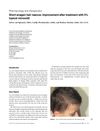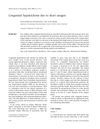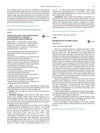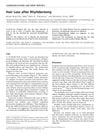Search
for
Sort by
Research
150-180 / 1000+ results
research Histologic Response to Topically Applied Minoxidil in Male-Pattern Alopecia
Minoxidil can help grow hair and make hair follicles bigger, but it can also cause side effects.

research Platelet-Rich Plasma Microneedling Versus 5% Topical Minoxidil in the Treatment of Patterned Hair Loss
Minoxidil works faster and is more cost-effective for treating hair loss, but platelet-rich plasma microneedling can be an alternative for those who can't use minoxidil.

research Chronic Telogen Effluvium: Increased Scalp Hair Shedding in Middle-Aged Women
Middle-aged women with chronic telogen effluvium experience increased hair shedding but usually don't get significantly thinner hair.

research Short Anagen Hair Nevus: Improvement After Treatment With 5% Topical Minoxidil
Using 5% topical minoxidil improved and normalized the hair growth in a girl with short anagen hair naevus.

research Minoxidil Use in Androgenic Alopecia
Minoxidil helps stimulate hair growth and enlarge small follicles in common hair loss, but doesn't stop it, and its effects can be boosted when combined with finasteride.

research Use of Topical Minoxidil as a Possible Adjunct to Hair Transplant Surgery
Minoxidil may help hair growth after transplant surgery.

research Coming Full Circle (Almost): Low Dose Oral Minoxidil for Alopecia
Low-dose oral minoxidil is an effective and safe treatment for hair loss.

research Shedding Light on Therapeutics in Alopecia and Their Relevance to COVID-19
Some alopecia treatments might help treat COVID-19, but more research is needed.

research The Local Hypothalamic–Pituitary–Adrenal Axis in Cultured Human Dermal Papilla Cells
Stress hormone CRF causes hair loss and inhibits hair growth in human cells.

research The Local Hypothalamic–Pituitary–Adrenal Axis in Cultured Human Dermal Papilla Cells
Stress hormone CRF causes hair loss and stops hair cell growth.

research Congenital Hypotrichosis Due to Short Anagen Phase
Some children are born with unusually short, fine hair because their hair growth phase is short, but this often gets better by itself during puberty.

research Alopecia Areata Incognita: Clinical Characteristics and Use of the Sinclair Shedding Scale
The Sinclair Shedding Scale is effective for diagnosing Alopecia Areata Incognita and monitoring treatment success.

research Eclipta Alba Extract With Potential For Hair Growth Promoting Activity
Eclipta alba extract may help hair grow similarly to Minoxidil.

research Curcuma Aeruginosa, A Novel Botanically Derived 5α-Reductase Inhibitor In The Treatment Of Male-Pattern Baldness: A Multicenter, Randomized, Double-Blind, Placebo-Controlled Study
Curcuma aeruginosa extract combined with minoxidil effectively treats male-pattern baldness.

research Caffeine and Its Pharmacological Benefits in the Management of Androgenetic Alopecia: A Review
Caffeine improves hair growth, thickness, and reduces shedding.

research Treatment of Hair Loss
Finasteride and minoxidil are effective for hair loss, but continued research is needed for better treatments.

research The Changes in the Hair Cycle During Gestation and the Post-Partum Period
Hair growth slows and shedding increases after childbirth, but most women don't experience excessive hair loss.

research Oral Minoxidil for Female Pattern Hair Loss and Other Alopecias
Oral minoxidil helps treat hair loss and has reversible side effects.

research Telogen Effluvium, Diagnosis and Management: A Narrative Review
Hair loss from Telogen Effluvium can be managed by treating the underlying cause and may improve with treatments like minoxidil.

research Medical Treatment of Alopecia
The most effective treatments for hair loss are minoxidil, finasteride, PRP, and hair transplants, with steroids and immunosuppressants for autoimmune types.

research Diffuse Hair Loss in Women
The document concluded that cyproterone acetate and minoxidil are effective for female hair loss, and a supportive doctor-patient relationship is important.

research Managing Hair Loss in Midlife Women
Effective treatment for midlife women's hair loss is limited, with 5% minoxidil foam being the only proven option for the most common type.

research Chronic Telogen Effluvium
Chronic Telogen Effluvium is a hair loss condition in middle-aged women that usually doesn't lead to complete baldness.

research Diseases of Hair and Nails
The document says that there are treatments for hair and nail diseases.

research The Basic Science of Hair Biology
Hair disorders are caused by a complex mix of biology, genetics, hormones, and environmental factors, affecting hair growth and leading to conditions like alopecia.

research Hair Graying and Loss Induced by Imatinib Mesylate
A woman's hair turned gray and fell out after starting a cancer drug called imatinib mesylate.

research Hair Loss After Rhytidectomy
A woman had temporary hair loss after a facelift, which improved on its own within a year.

research Radiation-Induced Alopecia After Endovascular Embolization Under Fluoroscopy
A man had temporary hair loss from radiation during a medical procedure but regrew his hair after treatment with minoxidil lotion.

research Alopecia
Alopecia areata is a reversible, autoimmune-related hair loss that can have significant emotional impact and uncertain treatment effectiveness.